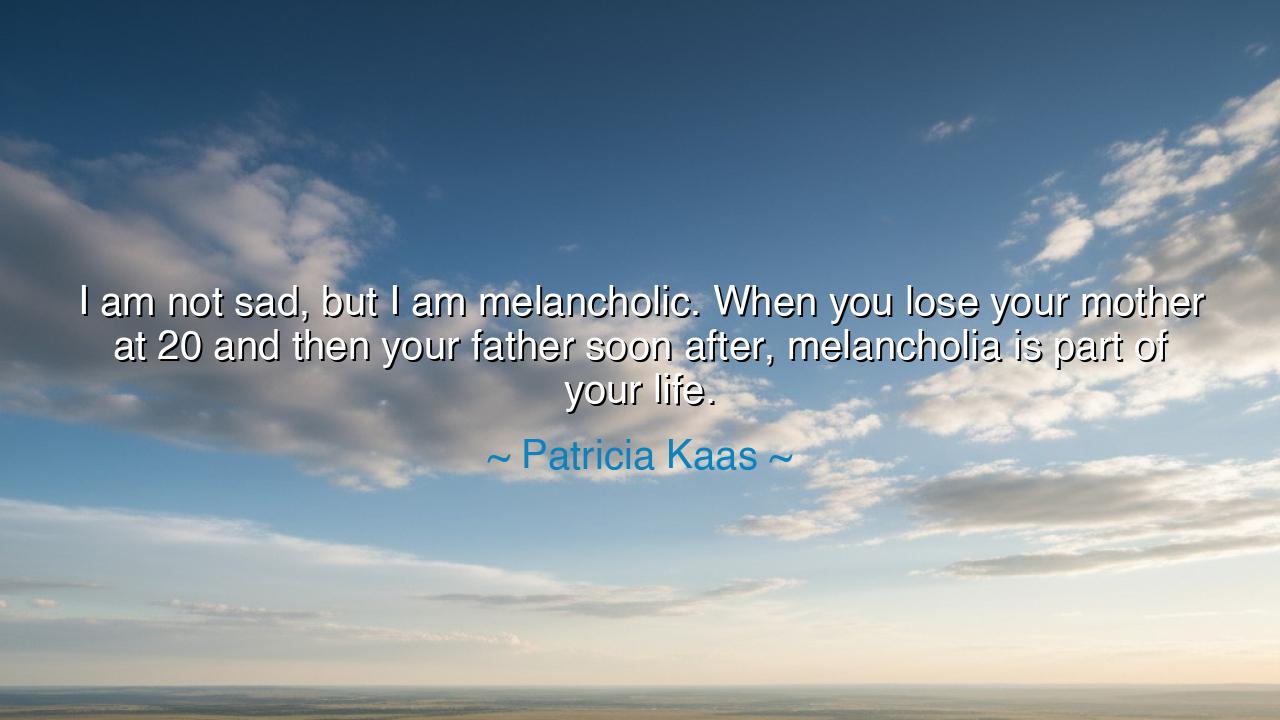
I am not sad, but I am melancholic. When you lose your mother at
I am not sad, but I am melancholic. When you lose your mother at 20 and then your father soon after, melancholia is part of your life.






Hear, O seekers of truth in sorrow and strength, the voice of Patricia Kaas, who spoke from the depths of her own life: “I am not sad, but I am melancholic. When you lose your mother at 20 and then your father soon after, melancholia is part of your life.” These words are not the outcry of despair, but the quiet wisdom of one who has walked with grief and learned to live with its shadow.
First, let us see the distinction she makes: not sad, but melancholic. Sadness is sharp, immediate, like the sting of a wound. It burns in the moment and then fades, like rain upon the skin. Melancholia, however, is different. It is not the passing storm but the climate of the soul. It settles into the heart, not as despair, but as a constant undertone, a reminder that loss, once endured, reshapes a person forever.
Her grief is anchored in the loss of her mother and father, the twin pillars of her life. To lose one parent in youth is already a weight almost too heavy to bear. To lose both, and so early, is to be thrust into the world stripped of the foundations of comfort and guidance. Kaas confesses that this wound did not leave her broken, but it left her changed. She learned that melancholia would not depart; it would stay, woven into her being, as much a part of her as breath.
History bears witness to others who walked this path. Recall Marcus Aurelius, emperor and philosopher, who lost his father when he was but a child and many of his own children in infancy. He carried with him not constant tears, but a deep and thoughtful gravity, the melancholia of impermanence. From that weight was born his Meditations, a book of wisdom that has guided countless souls. In like manner, Kaas teaches that grief, once endured, does not always crush—it can also deepen, soften, and give birth to insight.
The power of her words lies in their acceptance. She does not say she longs to be free of melancholia. Instead, she acknowledges it as part of her life, a companion on her journey. In this, she offers a path of peace: not to resist sorrow endlessly, nor to deny it, but to integrate it into one’s being. This is not weakness, but strength—an honesty that allows the wounded soul to move forward without pretending to be untouched.
The meaning, then, is that we cannot escape grief, but we can learn to walk with it. To be melancholic is not to be defeated; it is to live with the depth of remembrance, to carry the echo of love lost but never forgotten. Such a life may not always be light, but it is rich, authentic, and profound.
So take this lesson into your heart: when loss comes, do not measure yourself against the false promise of forgetting or the shallow demand to “move on.” Instead, let grief shape you into something deeper. Speak of your sorrows, honor your dead, and allow melancholia to remind you of love’s enduring power. Take practical steps: keep the memory of those you lost alive in rituals, in stories, in kindness done in their name. For in this way, you do not live chained to grief, but carried by it—transformed by sorrow into a being of greater compassion and wisdom. And thus, as Kaas shows us, melancholia can be not a burden only, but a quiet companion that teaches us how to live.






AAdministratorAdministrator
Welcome, honored guests. Please leave a comment, we will respond soon